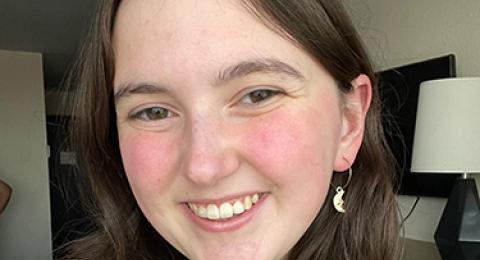The Psychology major at UNH is the most popular program within the College of Liberal Arts for good reason. Here you’ll study the mind and behavior in both humans and animals, exploring topics such as learning, social interaction, perception, identification and definition of abnormal behavior, counseling, drug effects, criminal psychology, and consciousness. Students engage in internships, earn credit for counseling work, present research at the Haslerud Conference, and participate in engaging events offered by the student-run Psychology Club. The department emphasizes careful advising and support throughout the student's journey to graduation.
What is psychology?
Psychology is the study of the mind and human and animal behavior – what motivates us to do the things that we do? In this degree program, you’ll learn scientific research and analysis methods while studying how we learn and develop, how we interact socially, how our minds affect the way we perceive things, and how we identify and define abnormal behavior. You’ll have the opportunity to study areas such as counseling, the effects of both recreational and therapeutic drugs, the psychology of crime and justice and the psychology of consciousness. Like many of our students, you might continue on to graduate study in a number of areas within the field.
Why study psychology at UNH?
As a student in the psychology degree program at UNH, you’ll test your interests intellectually in the classroom and through hands-on internships and research experiences. You’ll be able to earn academic credit for work experience in the field of counseling, and you’ll have the opportunity to present your research at the annual Haslerud Conference on campus. The Psychology Department prides itself on its careful student advising and support, and the Psychology Club is a student-run organization promoting activities of interest to psychology students.
Potential careers
- Clinician (social worker, mental health counselor)
- Clinical Psychologist/Forensic Psychologist
- School Psychologist
- Sport/Performance Psychologist
- Art therapist
- School counselor
- Academic or career counselor
- Genetics Counselor
- Consulting/Marketing/Sales
- Human Resources
- Lawyer
Curriculum & Requirements
The Psychology Major provides students with a broad education, while also allowing some specialization. The program exposes students to the scientific study of behavior and encourages an increased understanding of the behavior of humans and animals.
To declare a major in psychology, students must have completed PSYC 401 Introduction to Psychology and PSYC 402 Statistics in Psychology with a grade of C or better and have an overall GPA of 2.0.
Sample Degree Plan
This sample degree plan serves as a general guide; students collaborate with their academic advisor to develop a personalized degree plan to meet their academic goals and program requirements.
| First Year | ||
|---|---|---|
| Fall | Credits | |
| ENGL 401 | First-Year Writing | 4 |
| PSYC 400 | Psychology Freshmen Advising Seminar | 1 |
| PSYC 401 | Introduction to Psychology | 4 |
| Language Course | 4 | |
| Discovery Course | 4 | |
| Credits | 17 | |
| Spring | ||
| PSYC 402 | Statistics in Psychology (QR DISC) | 4 |
| PSYC 500-level Breadth Course | 4 | |
| Language Course | 4 | |
| Discovery Course | 4 | |
| Credits | 16 | |
| Second Year | ||
| Fall | ||
| PSYC 502 | Research Methods in Psychology | 4 |
| PSYC 500-level Breadth Course | 4 | |
| Discovery Course | 4 | |
| Elective Course | 4 | |
| Credits | 16 | |
| Spring | ||
| PSYC 500-level Breadth Course | 4 | |
| Discovery Course | 4 | |
| Discovery Course | 4 | |
| Elective Course | 4 | |
| Credits | 16 | |
| Third Year | ||
| Fall | ||
| PSYC 500-level Breadth Course | 4 | |
| Discovery Course | 4 | |
| Discovery Course | 4 | |
| Elective Course | 4 | |
| Credits | 16 | |
| Spring | ||
| PSYC 700-level Depth Course | 4 | |
| Discovery Course | 4 | |
| Discovery Course | 4 | |
| Elective Course | 4 | |
| Credits | 16 | |
| Fourth Year | ||
| Fall | ||
| PSYC 700-level Depth Course | 4 | |
| PSYC 700-level Depth Course | 4 | |
| Elective Course | 4 | |
| Elective Course | 4 | |
| Credits | 16 | |
| Spring | ||
| PSYC 700-level Depth Course | 4 | |
| Elective Course | 4 | |
| Elective Course | 4 | |
| Elective Course | 4 | |
| Credits | 16 | |
| Total Credits | 129 | |
Degree Requirements
All Major, Option and Elective Requirements as indicated.
*Major GPA requirements as indicated.
Major Requirements
Students majoring in psychology must complete 44 credits with a minimum grade of C- in each course and a 2.0 overall average in all major requirements.
| Code | Title | Credits |
|---|---|---|
| Required Courses | ||
| PSYC 400 | Psychology Freshmen Advising Seminar | 1 |
| Core Courses | ||
| PSYC 401 | Introduction to Psychology | 4 |
| PSYC 402 | Statistics in Psychology | 4 |
| PSYC 502 | Research Methods in Psychology | 4 |
| Breadth (500-level) courses | ||
| Group I - Select two courses from the following: | 8 | |
PSYC 511 | Sensation and Perception | |
PSYC 512 | Psychology of Primates | |
PSYC 513 | Cognitive Psychology | |
PSYC 521 | Behavior Analysis | |
PSYC 522 | Behaviorism (offered in Manchester only) | |
PSYC 531 | Psychobiology | |
| Group II - Select two courses from the following: | 8 | |
PSYC 552 | Social Psychology | |
PSYC 553 | Personality | |
PSYC 561 | Psychopathology | |
PSYC 571 | Pioneers of Psychology (offered in Manchester only) | |
PSYC 581 | Child Development | |
| Depth (700-level) courses | ||
| Group I - Select two courses from the following: | 8 | |
PSYC 705 | Tests and Measurement | |
PSYC 710 | Visual Perception | |
PSYC 712W | Psychology of Language | |
PSYC 713W | Psychology of Consciousness | |
PSYC 713 | Psychology of Consciousness | |
PSYC 720 | Animal Cognition | |
PSYC 722 | Behaviorism, Culture, and Contemporary Society | |
PSYC 731 | Brain and Behavior | |
PSYC 733 | Drugs and Behavior | |
PSYC 735 | Neurobiology of Mood Disorders | |
PSYC 736 | Attention Disorders | |
PSYC 741W | Special Topics (examples:Fundamentals of Substance Abuse, Neuroscience of Memory, Fundamentals of Cognitive Science, Neurobiology of Spatial Cognition & Memory, Psychology of Curiosity) | |
| Group II - Select two courses from the following: | 8 | |
PSYC 705 | Tests and Measurement | |
PSYC 755 | Psychology and Law | |
PSYC 756 | Psychology of Crime and Justice | |
PSYC 757 | Psychology of Happiness | |
PSYC 758 | Health Psychology | |
PSYC 759W | Emotion and the Embodied Mind | |
PSYC 760W | Ecopsychology | |
PSYC 761W | Sport and Performance Psychology | |
PSYC 762 | Counseling | |
PSYC 782W | Autobiographical Memory | |
PSYC 785 | Social Development | |
PSYC 793 | Internship | |
PSYC 791W | Special Topics (examples: Culture and Human Development, Socio & Moral Judgement Development) | |
| Capstone | ||
| Select from the following: | ||
PSYC 793 | Internship | |
or PSYC 798 | Capstone | |
or PSYC 799 | Senior Honors Thesis | |
| Total Credits | 45 | |
Note: Many courses have one or more prerequisites. Students (with advisor assistance) are expected to select breadth courses that will later enable them to select depth courses appropriate to their interests and career goals.
Capstone
The Discovery Program capstone requirement, taken during the senior year, may be fulfilled by completing one of the following options:
- The honors-in-major program with an honors project; honors seminar, and research presentation (PSYC 799 Senior Honors Thesis);
- A 4-credit capstone designated independent study project (PSYC 795 Independent Study);
- PSYC 793 Internship;
- Capstone-designated 700-level course.
Statistics
The psychology department does not accept other departments' statistics courses toward the psychology major. Students who have taken a statistics course other than PSYC 402 must pass a competency exam in order to declare the major and/or register for PSYC 402.
Discovery Program
- Major department courses may not be used to satisfy Discovery category requirements except for PSYC 402, which may be used to satisfy the QR Discovery requirement and the major requirement.
- PSYC 401 cannot be used to fulfill a Social Science.
- PSYC 571 cannot be used to fulfill a Historical Perspective.
- In the case that Psychology is a second major, major courses can be counted toward the Discovery requirements.
Transfer Students
Transfer students who elect to major in Psychology must complete at least 24 credits in the program at UNH to qualify for the degree in Psychology. Transfer students must earn a total of 44 approved credits for completion of the Psychology Major. The distribution of these credits will be determined by the department's academic counselor. Transfer students should note that courses are allotted only the number of credits granted by the original institution (after adjustments for semester-hour equivalents). Thus, students transferring from an institution at which courses carry fewer than four credits each must make up for any credit deficit created by the acceptance of transfer credits into the Psychology Major. Only courses taken in a Psychology Department can be transferred into the Psychology Major. Of the four 700-level courses required for the major, at least three must be taken at UNH.
Additional Notes
Specific course selections should be discussed with an advisor. Exceptions to the requirements for the major require compelling circumstances and a petition to the department.
Psychology majors planning to go on to graduate study in Psychology are advised to include PSYC 705 Tests and Measurement among their courses.
Candidates for a degree must satisfy all of the University Discovery Program requirements in addition to satisfying the requirements of each individual major program. Bachelor of Arts candidates must also satisfy the foreign language proficiency requirement.
Program Learning Outcomes
- Demonstrate fundamental knowledge and comprehension of the major concepts, theoretical perspectives, historical trends, and empirical findings in psychology.
- Understand basic research methods in psychology including design, data analysis, and interpretation; and utilize this knowledge to conduct their own psychological research, with an appreciation of the ethical issues involved in human and non-human research.
- Engage in scientific reasoning and problem solving so that they can evaluate the quality and implications of scientific research.
- Write empirical research reports and literature reviews in American Psychological Association style and present findings from scientific research.
Explore Program Details
You may take any 700 level Psychology course in your senior year for Capstone credit.
- At the beginning of the semester, ask your professor about the possibility of taking the course for Capstone credit. Remember that your professor is not obligated to designate a course for Capstone credit. Please be respectful in approaching your professor, and if the answer is no, please accept this decision.
- Meet and discuss with your professor what you will be doing to constitute your Capstone experience. In some cases, it will be an extra assignment; in others it will involve the expansion of existing class work. Your professor will use his/her professional discretion to determine what constitutes as your Capstone experience.
- Fill out the Capstone Designation Form (found in the Psychology office); both you and your professor will need to sign it. Submit the form to the Psychology Department Office.
- The Psychology Department will register you for PSYC 798: Capstone, a 0 credit course so that it reflects on your degree evaluation.









